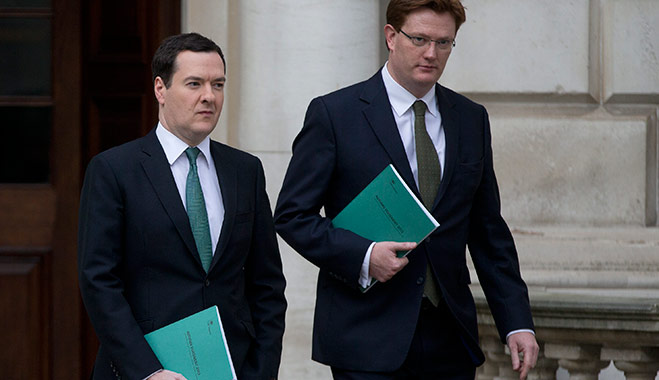
Just six months ago, economic growth in the UK was stalling. At the budget announcement in March, Chancellor George Osborne was forced to strike a somewhat sheepish tone when he announced that the Office for Budget Responsibility – a group he helped set up – predicted that growth for 2013 would be a measly 0.6 percent – just half the previously forecast 1.2 percent. Osborne was ridiculed for his insistence on making severe cuts to the UK’s budget, stifling any signs of economic growth and prolonging the stagnation of the economy.
However, when Osborne rose from his seat at December’s delayed Autumn Statement, he did so with renewed confidence and a sense of justification. Britain’s economy appears to be back on track, with growth forecasts being raised to 1.4 percent this year. Although many expected him to crow about how he was right all along to pursue austerity – while also handing out a few pre-election gifts to get the electorate back on side – Osborne in fact struck a more cautious tone.
Budget cuts to continue
Dampening the mood, he announced that budgets would continue to be cut over the next three years, signalling a continuation of the austerity measures that got him criticised in the first place. However, this time Osborne has been praised for sticking the course and taking a more responsible attitude towards ensuring the UK economy is balanced and sustainable. How sustainable the recovery is remains to be seen.
Critics have said that a boom in consumer spending and soaring London property prices has buffeted growth. While that may be part of the story, the insistence on streamlining government departmental budgets is certainly helping to create a more sustainable recovery.
Other initiatives announced in the Autumn Statement are also sensible strategies for the country. The bringing forward of the rise in pension age is needed and fair, in light of improving health standards and the ageing population. Bringing foreign property owners into the capital gains tax net is also a welcome move, helping to stem the rampant flow of foreign money into London’s vastly inflated property market.
Signs of life, but there’s still room for improvement
Although Osborne should be applauded for getting the UK’s deficit under control, there is much more than can be done. Ever since the coalition government came to power in 2010 it has promised to invest in the country’s creaking infrastructure. Each year, eye-watering budgets have been announced for projects that include motorways, high speed rail, high speed broadband, and airport expansion. However, each year little progress has been made on any of these projects.
High speed rail has suffered protests and delays, only recently getting parliamentary approval. Funding is yet to be raised – although the Chinese government has signalled it might be willing to invest – and is unlikely to be finished before the mid-2030s. The government should either fully commit to building it – and paying for it – or divert the money towards improving the existing rail network.
Similarly, the woefully inadequate amount of airport capacity in the southeast of England has seen no progress, instead being kicked into the long-grass in the form of Sir Howard Davies’ Airport Commission. Instead of giving the green light to improving Gatwick Airport’s train station and conducting a ‘feasibility study’ into improving links to Heathrow, Osborne should make firmer commitments to expanding capacity at one of the airports.
An idea mooted by London Mayor Boris Johnson to build a hub airport in the Thames Estuary may seem fanciful and expensive, but it is the sort of transformative investment that would attract global investors, and radically improve the UK’s connections to the rest of the world. Constant delaying of a decision on airport expansion is only allowing Britain’s European rivals to storm ahead in connecting to lucrative markets in Asia.
Encouraging signs and sensible decisions have underpinned Osborne’s delayed Autumn Statement, but he must make bolder attempts at building a new infrastructure network in the UK, helping to create a country fit for the 21st century.


